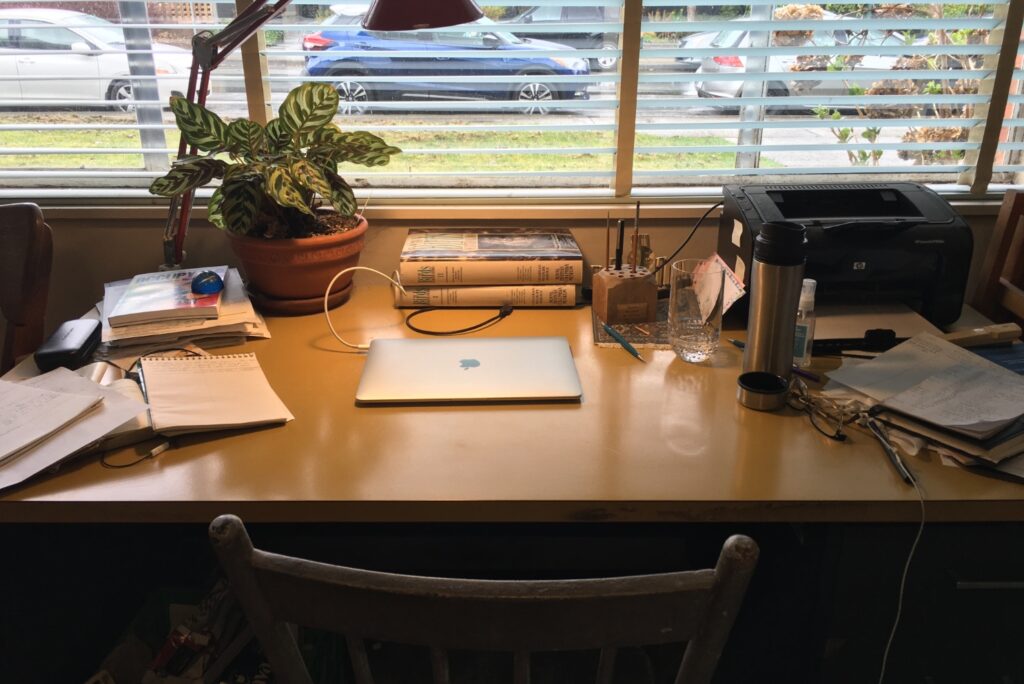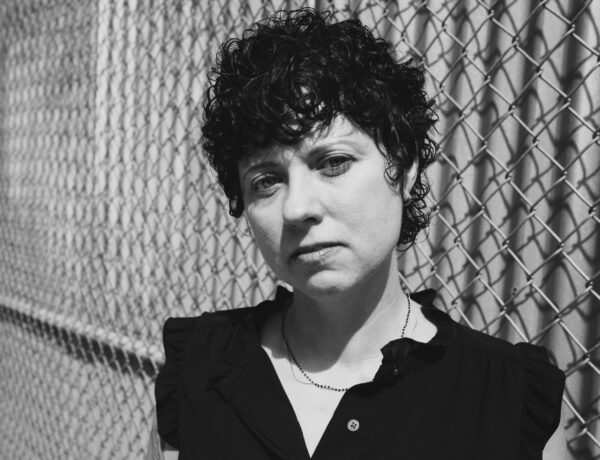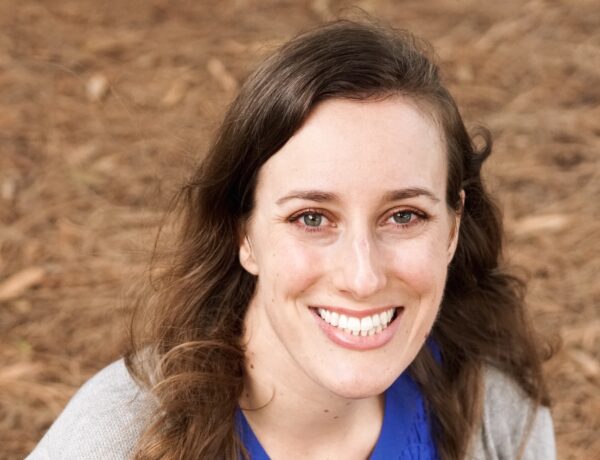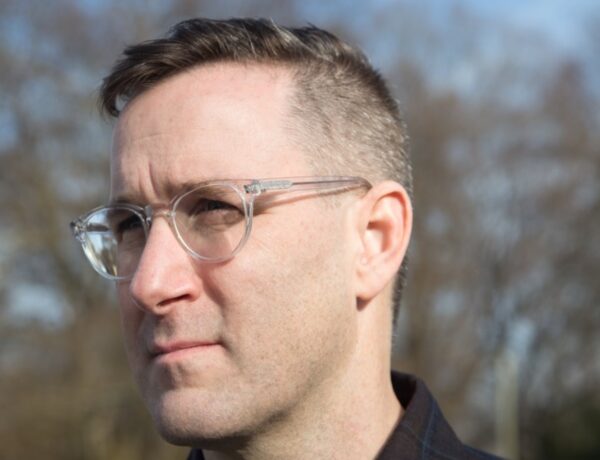J. B. MacKinnon is the author or co-author of five books of nonfiction. An award-winning journalist, his work has appeared in such publications as the New Yorker, National Geographic, and the Atlantic, as well as the Best American Science and Nature Writing anthologies.
He is an adjunct professor of journalism at the University of British Columbia, where he teaches feature writing. MacKinnon’s latest book is The Day the World Stops Shopping, a thought experiment that imagines what would happen—to our economies, our products, our planet, ourselves—if we committed to consuming far fewer of the Earth’s resources.
MacKinnon also works in documentaries, most notably as writer for Bear 71, an internationally acclaimed digital interactive that explores the intersection of the wired and wild worlds through the true story of a mother grizzly bear. He lives in Vancouver, Canada.
Hi J.B., thanks for joining us today! Your latest book, The Day the World Stops Shopping, explores the idea of consuming less as a strategy for saving the environment. How did the concept for this book come about, and what inspired you to delve into this thought experiment?
I write mainly about nature and environment, and I’ve come to realize that the root cause of many of the environmental problems we face is consumerism. Rarely, however, do we talk about these problems in this way. For example, we look at deforestation and say that it’s caused by logging. But why do we cut down forests? To make wood and paper products that are sold to consumers. According to a UN panel on global natural resources, consumption has now surpassed population growth as a driver of environmental impacts. How much each one of us consumes now matters more than how many of us there are.
The fact that next to no one was talking about consumption was an opportunity, but also presented a barrier to catching readers’ attention. I needed to find a way to talk about this issue that would be engaging to readers who might not otherwise be thinking about it. One day, the title of the book popped into my head: The Day the World Stops Shopping. I realized I could write a thought experiment that played out what would happen—to the planet, the economy, our products, ourselves—if we suddenly slowed our consumption. It would be like a disaster movie, but one where another world rises up as the old one crumbles. I hoped that would make a difficult subject more compelling to read.
The book envisions a world where we commit to consuming fewer resources. Can you share your own journey and experiences with adopting a more sustainable lifestyle, and how that has influenced your writing on this subject?
I grew up alongside a grassland, and spent a lot of time in nature as a kid. Pretty early on (I joined Greenpeace in grade five), I could see the link between our lifestyles and our environmental impacts. I wouldn’t say I’ve been on any kind of life-long mission to reduce my impacts, but I’ve always felt a background sense that I should keep my demands on the planet fairly modest.
None of that has caused me any material discomfort. I eat a largely vegetarian and locally sourced diet, which I prefer to other ways of eating. I get around Vancouver mainly by bicycle, which, again, is my favorite mode of transportation (traveling on foot is my second choice, followed by public transit, then by car). I don’t buy a lot of things, but I do buy things that feel important to me. I don’t really feel like I’m sacrificing anything.
Simpler living influences my writing in that I know, I have personally experienced, that it is possible to live a satisfying life at a lower level of environmental impact than the average, and especially the above-average, wealthy world citizen. It also helps me see more clearly all the powerful forces that push us to consume far beyond what is necessary to our happiness, from pervasive advertising and marketing, to an economic system dependent on ever-more consumption, to social pressures to show status through income and possessions, and so on.
As an author of nonfiction, you’ve covered a diverse range of topics in your books. How do you approach the research process for each new project, and how has your background in journalism influenced your writing routine?
I research all of my projects in roughly the same way. I start by either stumbling onto a story, or finding myself with a question I want to answer. I then do a fairly broad sweep of initial research, just so I can feel my way forward more ably and get a sense of the underlying themes and narratives involved. At that point I start doing interviews, with the goal of narrowing in on a focused way to tell the story (if it’s a narrative), or a focused point that I want to make (for more essayistic pieces). Once that focus starts to sharpen, I deepen my research and reporting in that direction. It’s a roughly hourglass-shaped process: starting broadly and narrowing in on a focus, and then widening again to learn all I can about my more focused idea.
Can you share some insights into your creative process when writing books that combine investigative journalism, environmentalism, and social commentary? How do you balance the various elements to create a cohesive and engaging narrative?
I often find myself writing about topics that do not have a ready-made audience at all, as was the case with The Day the World Stops Shopping. One of the few benefits of writing from these shadows is that I’ve learned never to assume that what I’m writing about will be interesting to a lot of other people. I think hard about how to give as many readers as possible a potential stake in the story.
That might mean a thought experiment that I hope they might find interesting (The 100-Mile Diet, The Day the World Stops Shopping), or a narrative hook (The Demon River, True Grit); when I wrote about beaked whales, a class of animals nearly no one has heard of, I highlighted the mystery of how such large creatures have stayed hidden from us.
This creative investment in how to make a story connect doesn’t always work wonders, but I think it always does help me reach more readers than I would have without that effort. I wrote a story about planned obsolescence in lightbulbs once that became a No. 1 read on the New Yorker site. That definitely exceeded expectations all around.
As an adjunct professor of journalism at the University of British Columbia, how do you balance your teaching responsibilities with your writing career? Does your experience in the classroom inform or impact your writing process in any way?
I have a very limited teaching schedule: I teach one course (feature writing), one term per year, to graduate students. That leaves me eight months a year to dedicate fully to other work, and I dial things back in the fall so that I have the space to put proper effort into teaching. Teaching is probably not the best use of my time from a financial perspective, but I find it valuable in other ways. It caused me to properly analyze my researching and writing processes, which has sped up my writing process and helped me push my own boundaries.
Teaching also broadens my world—I’m always impressed by the range of ideas that students come up with, and it keeps me connected with how younger generations are thinking. (It also inoculates me from becoming an inveterate grumbler about the “kids these days.”) Best of all, breaking down writing with a roomful of smart people every week for three hours always makes writing feel exciting and worth doing, which can be a hard feeling to come by in the workaday world.
In your work, you’ve collaborated with a diverse range of individuals, such as coauthoring The 100-Mile Diet with Alisa Smith and working on I Live Here with Mia Kirshner and artists Michael Simons and Paul Shoebridge. How have these collaborations shaped your creative process and approach to storytelling?
Working collaboratively exposes me to other ways of seeing a subject, which helps open up the mind and let some fresh air in. It also helps crystallize what I have to bring to the table that’s unique. The question in a collaboration is always, “When do I step up, and when do I step back?” I recently wrote the narration for a National Film Board short documentary, and when I showed up for the sound-mixing stage, someone joked, “Uh oh, the writer’s here, the narration is going to get longer.” I laughed, but mostly because I am exactly the opposite of that kind of writer. Throughout the mix, I was constantly watching for where the music, sound design, or imagery was doing work that made the narration I had written unnecessary. I ended up cutting more words than I added.
Throughout your career, you’ve explored various forms of storytelling, such as writing for documentaries like Bear 71. How do you approach writing for different mediums, and what unique challenges and opportunities does each form present?
Fundamentally, they’re all the same. You’re telling a story or making an argument. You have to work with what you’ve got—whether it’s immediately gripping, or nuanced and subtle—to make it as compelling as possible to the reader or viewer or listener. Themes will be in play, but might be quietly in the background or loudly at the forefront. What’s different when writing for other mediums is simply that question of who does what. Scenes are an obvious example.
In a magazine feature, writing descriptions that you can picture in the mind’s eye is often essential. On film, actual pictures are going to do that work. It sounds mundane, and at one level it is. But just like in writing, what lifts work in other mediums up are the choices of what to include, what to leave out, how to start, how to end—choices that can be informed by an understanding of structure, but also intimately involved gut feeling.
When I’m writing a piece, I pay a lot of attention to what my subconscious mind has dropped into the early drafts. There always seem to be these threads that are just waiting to be pulled together, and when I finally do that, the story starts to have this inner resonance, this hum. In other mediums, the search for harmonies is the same, but it’s done collaboratively, and with more layers to work with.
As an accomplished author and journalist, what advice would you give to aspiring writers who are looking to explore similar topics and themes in their work? Are there any practices or habits that you’ve found particularly helpful in fostering your creativity and productivity?
My main suggestion is to pay attention to whether you’re writing intuitively, or structurally. Do you just sit down and write, without really knowing why, and find your way forward? You’re operating more intuitively. Do you outline, think hard about themes, write nut grafs that try to capture what you’re setting out to do? You’re taking a more structural approach. Or maybe you’re somewhere in-between. But I think it’s important to develop self-awareness about where your strengths and weaknesses lie across this spectrum, so that you can build on your strengths and work on your weaknesses.
In my case, I’ve gone full circle. I started out feeling lost a lot of the time (I didn’t study writing or journalism), and eventually realized I needed to develop a stronger sense of how to structure my writing. Now that I have a good sense of structure, I’m going back to a more intuitive approach. I’m trying to listen carefully to what feels like the right way to do the work that needs to be done in a story, and to open up more to subconscious rather than conscious reactions. The best writing has a strong structure, but one that evokes deep feelings.
If you could have a conversation with any author throughout history about their writing routine and creative process, who would that person be?
Probably the writer whose work first revealed to me that nonfiction could be easily as exciting as fiction, but with a humility I didn’t find in the New Journalism gang. That would be Ryszard Kapuściński, the Polish foreign correspondent and author.
I’d love to know about the books you’re reading at the moment. What have been some of your favorite recent reads?
I think I might have especially rando readings patterns, but here goes: Right now I’m reading Philip Gourevitch’s story of the 1994 Rwandan genocide, We Wish to Inform You That Tomorrow We Will Be Killed with Our Families, as well the novel Pedro Páramo, by Juan Rulfo. I just finished the novel Civilizations, by Laurent Binet. A few other recent reads that come to mind are The Epic of Gilgamesh (finally got around to that one), the novel Girl, Woman, Other, by Bernardine Evaristo, a little binge of W. G. Sebald books, and The Sea, the Sea, a novel by Iris Murdoch.

Affiliate disclaimer: Some links on this website are affiliate links. We may earn a small commission if you make a purchase through these links, but only promote products we truly believe in. We disclose affiliate links and give honest reviews.



No Comments